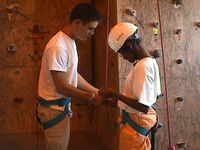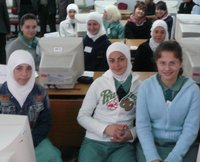A recent issue of Education Week featured a ninth grade transition program that combats the drop-out problem associated with movement from middle to high school – see “Pittsburgh Building ‘Nation’ of 9th Graders.” Education Week, August 29, 2007
The idea was to target not just the teenagers’ heads, but also their hearts. A week of getting used to their new schools, befriending their classmates and teachers, and undertaking adventures together was designed to forge what district officials are calling a “9th Grade Nation”—a freshman class that moves through high school feeling supported and confident. Read 9grade-Nation (98KB pdf)
Reading about this program reminded me of a summer program that I designed and served as founding director from 1999-2000. The "Summer Prep Program" targeted students exiting 5th – 8th grade who were academically at-risk. Elementary, middle and high school teachers (and a dedicated school nurse) delivered a specially designed three-week curriculum designed to engage students in their learning and foster a positive attitude towards school. A dozen high school and college interns assisted in the program, serving as positive role models and establishing friendships that will extend into the school year. Summer Prep produced excellent results with nearly one-half of our students improving their grades in three or four of their core courses.
Specially trained teams of teachers provide daily instruction in English, math, technology, library research, learning and organizational skills. Each grade was divided into small sections. Classes were held from 8 AM – 11 AM, Monday – Thursday.  Each Friday was reserved for an activity day – indoor wall climbing, ropes, obstacle courses, kayaking, and even a juggling workshop. As one parent wrote about the program "The Summer Prep School was the best thing that could have happened to my daughter this summer. She struggled throughout the school year – and with the frustration of struggling, she lost confidence and enthusiasm for school in general. However, this excellent program spurred in her a renewed interest in learning. Every day as I picked her up, she had a fun and exciting anecdote to tell me about. She absolutely loved her writing class – believe it showed as I am leafing through her folder tonight at Open House. I would like to thank Mr. Pappas for his extreme enthusiasm and support of our daughter at a very difficult personal as well as scholastic juncture in her life."
Each Friday was reserved for an activity day – indoor wall climbing, ropes, obstacle courses, kayaking, and even a juggling workshop. As one parent wrote about the program "The Summer Prep School was the best thing that could have happened to my daughter this summer. She struggled throughout the school year – and with the frustration of struggling, she lost confidence and enthusiasm for school in general. However, this excellent program spurred in her a renewed interest in learning. Every day as I picked her up, she had a fun and exciting anecdote to tell me about. She absolutely loved her writing class – believe it showed as I am leafing through her folder tonight at Open House. I would like to thank Mr. Pappas for his extreme enthusiasm and support of our daughter at a very difficult personal as well as scholastic juncture in her life."
The cooperation and teamwork of parent, student and teacher is essential to success. Parents’ workshops were offered to support and inform the parents with practical activities and techniques in communications, discipline, academic support and problem solving.
As one parent wrote about the parenting workshops "Over the last 4 weeks – my relationship with my daughter has grown by leaps and bounds!! This program has helped me to identify the behaviors she exhibits that trigger me to get upset. The whole family has had benefits, especially with improvements in communications. More concrete boundaries and expectations have been established and our family life had been more relaxed, peaceful, and less stressful. Thank you for offering our expertise. I have looked forward to Tuesday evenings this summer."
Visit an archived version of the Summer Prep School website and read more about the program in the SAANYS Journal. Find out more about Summer Prep and Ninth Grade Academies at Small Learning Academies that Work.


